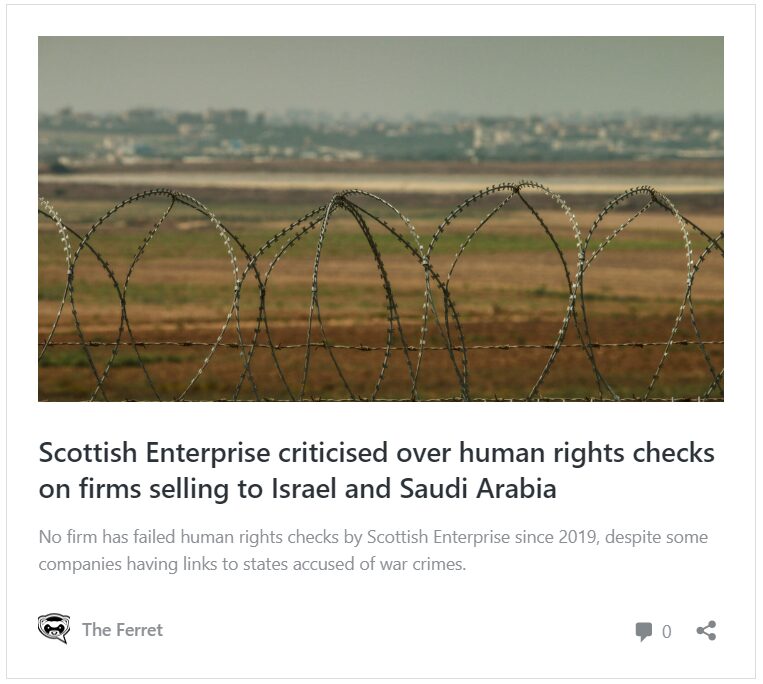
A Scottish Government agency has given hundreds of thousands of pounds of taxpayer money to arms companies supplying Israel since it began its bombardment of Gaza.
The Ferret has learned that Raytheon, BAE Systems and Leonardo have all received six-figure grants from business agency Scottish Enterprise since Israel began bombing Gaza in retaliation for a Hamas terror attack on 7 October 2023, which killed around 1,200 people, mostly Israeli civilians.
More than 35,000 people – the majority women and children – have been killed in Gaza since Israel launched its offensive.
BAE was paid its grant – worth £360,000 – on 4 April, the day after then-first minister Humza Yousaf wrote to the UK Government calling for an end to UK arms sales to Israel. BAE has partnered with a US firm on the F-35 fighter jet which Israel has used in its bombing of Gaza.
The Ferret also found through a freedom of information (FoI) request that Scottish Enterprise has had no discussions about changing its policy on giving grants to defence companies linked to the war.
Scottish Enterprise and the Scottish Government both said they had “repeatedly stated” that they do “not provide support for the development of munitions or weaponry” and that the projects funded are “unrelated to the deeply distressing situation in the Middle East”.

This week the chief prosecutor of the International Criminal Court applied for arrest warrants for war crimes and crimes against humanity for leading Hamas figures as well as Israeli prime minister, Benjamin Netanyahu.
That prompted the SNP leader at Westminster, Stephen Flynn, to claim that the UK Government was “complicit” in the deaths of “thousands of civilians” in Gaza because it had failed to halt the supply of arms to Israel.
But opposition parties at Holyrood claimed many would find it “utterly shocking and inexplicable” to learn that the SNP-run Scottish Government’s enterprise agency was still funding companies allegedly “fueling” the war in Gaza, given its public statements.
Amnesty International UK said it was “staggering” that arms firms supplying the Israeli military had been “waived through Scottish Enterprise due diligence processes”.
The UK subsidiary of Italian company Leonardo received a grant worth £159,125 from Scottish Enterprise on 18 October last year, at which point Israel had begun aerial bombing of the Gaza Strip. The grant was for a research and development project for “civilian markets and products”.
Leonardo reportedly makes the laser targeting systems for F-35 aircraft used by Israel at its site in Edinburgh. The site has repeatedly been targeted by pro-Palestinian demonstrators.
The company also delivered 30 Aermacchi M346 aircraft to the Israeli Air Force in 2016.

Raytheon Systems Ltd was paid £250,000 on 14 February 2024 for an unspecified research project which would focus on “new markets and customers”.
Raytheon has a factory in Glenrothes in Fife. The firm supplies Israel’s ‘Iron Dome’ missile defence system and has made smart bombs used by the country’s military.
BAE Surface Ships Ltd was given a £360,000 grant to support the training of staff in “new ways of constructing naval ships on the Clyde”.
Its parent company, BAE Systems, also makes components for fighter jets taking part in the bombardment of Gaza.
A new human rights procedure was introduced by Scottish Enterprise in March 2019, following criticism of the public body for funding arms firms selling to countries with poor human rights records.
Last November, The Ferret revealed that despite Scottish Enterprise having conducted 199 human rights checks since 2021, no firm had failed, despite some having links to states accused of war crimes, including Israel and Saudi Arabia.
Our inquiry followed a FoI reply by Scottish Enterprise in 2020 revealing that 178 firms had undergone human rights checks since they were introduced in March 2019, and no firm had failed.

Scottish Greens MSP, Ross Greer, said that our finding that the agency had made no change to its human rights checks since the Israeli assault on Gaza showed the checks were “nothing more than a box-ticking exercise”.
“If a multi-billion bound arms dealer whose weapons are being used to commit a genocide can pass your human rights test, it’s not worth the paper it’s written on. We will be pushing for a complete overhaul of this assessment system,” Greer added.
“Humza Yousaf offered clear moral leadership in his consistent calls for a ceasefire and an end to arms sales,” Greer told The Ferret. “Many will find it utterly shocking and inexplicable that, at the same time the then-first minister was calling for an end to the violence, his government’s enterprise agency was funding the very companies fuelling it.”
Scottish Labour MSP, Katy Clark, raised the issue of public grants going to arms firms linked to Israel in Holyrood in November. She criticised the Scottish Government for “hesitancy” on the issue.
Clark said: “At a time when Israel is being accused of serious war crimes, the Scottish Government has a moral obligation to take a stand. The message must be that these crimes are not in our name and we should be doing everything within our power to stop them.”
Neil Cowan, the Scotland director of Amnesty International, argued Scottish ministers must “stop ignoring Scottish Enterprise’s use of taxpayers’ money to companies involved in manufacturing and supplying weapons to Israel”.
“Any transfer of arms or their components to Israel risks facilitating the ongoing horrors that are unfolding, as well as reinforcing Israel’s system of oppression and apartheid domination,” Cowan said.
“No public money should be supporting the development or manufacture of weapons used to commit human rights violations and war crimes, and with the civilian death toll in Gaza mounting inexorably it’s staggering that arms firms supplying the Israeli military have been waived through Scottish Enterprise’s due diligence process.”
No public money should be supporting the development or manufacture of weapons used to commit human rights violations and war crimes.
Neil Cowan, Amnesty International
A Scottish Enterprise spokesperson said: “We have repeatedly stated our position that Scottish Enterprise does not provide support for the development of munitions or weaponry.
“The projects referred to here are unrelated to the deeply distressing situation in the Middle East. Instead, they include training support for sustainable and modern shipbuilding on the Clyde, product development for diversification into civilian markets, and job creation including graduate roles and apprenticeships.
“Scottish Enterprise is a ‘gap’ funder, providing a minority contribution, with companies having to invest significantly higher amounts in Scotland and their Scottish workforce to unlock our funds. Our robust due diligence process fully aligns with Scottish Government guidance, and any funding agreement we enter into with a company must comply with UK and Scottish law.”
A BAE Systems spokesperson said: “The ongoing violence in the Middle East is having a devastating impact on civilians in the region and we hope the parties involved find a way to end the violence as soon as possible. We operate under the tightest regulation and comply fully with all applicable defence export controls, which are subject to ongoing assessment.
“As part of a wider £300m commitment to shipbuilding on the Clyde, BAE Systems is investing in a new applied shipbuilding academy. We welcome the additional funding from Scottish Enterprise which will support the ambition to attract, retain and develop the workforce of the future and both help secure the long-term viability of shipbuilding in Glasgow and provide an ongoing valued and significant contribution to the Scottish economy.”
Raytheon and Leonardo have been asked to comment.
FOI response
Main image: Aermacchi M346. Credit: Ronnie Macdonald/Wikimedia














